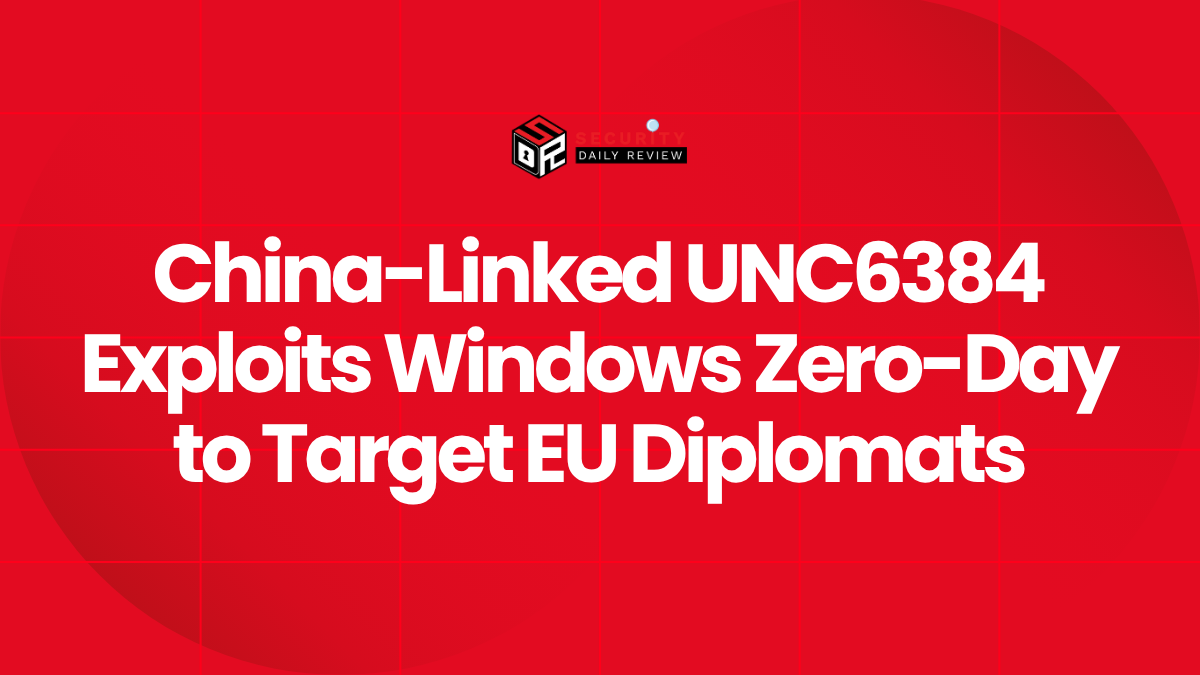A new wave of cyber espionage has emerged in Europe, as cybersecurity researchers from Arctic Wolf Labs have disclosed a highly targeted campaign exploiting a previously unknown Windows zero-day vulnerability. The advanced persistent threat (APT) group behind the attacks, identified as UNC6384, is believed to have links to China. The group has been observed targeting diplomatic entities across Hungary, Belgium, and several other European Union (EU) countries.
This attack marks a concerning expansion of China-nexus cyber operations beyond their traditionally targeted regions. The use of a Windows zero-day vulnerability by UNC6384 adds a layer of sophistication that indicates both significant resources and strategic intent.
Advanced Tactics Enable Precise Targeting of EU Diplomats
China-backed threat actor UNC6384 has leveraged a zero-day vulnerability in Microsoft Windows to gain a foothold in sensitive European networks. According to Arctic Wolf Labs, the campaign targeted diplomatic organizations with precision and stealth, suggesting the group’s deep understanding of geopolitical contexts and tailored espionage goals.
UNC6384’s Latest Campaign Demonstrates Strategic Geopolitical Intelligence Gathering
UNC6384 has historically focused its efforts on Southeast Asia, but this new campaign demonstrates a pivot toward European interests. Researchers revealed the group had compromised diplomatic missions through spear-phishing emails, taking advantage of the Windows vulnerability to establish persistence and exfiltrate sensitive political data.
Notably, the attackers appear to have selected their targets based on geopolitical relevance, with diplomats and embassy staff in countries such as Hungary and Belgium among those affected. The motivations appear to center on gathering intelligence related to EU foreign policy.
“This campaign continues a troubling pattern of Chinese APT operations adapting quickly and expanding scope,” said researchers at Arctic Wolf Labs.
Exploited Vulnerability was a Zero-Day in Windows Shell
The core of UNC6384’s espionage toolkit in this campaign is its exploitation of a zero-day vulnerability in Windows. The flaw, located in the Windows Shell component, allowed attackers to execute arbitrary code and maintain persistence after compromising the host system.
This vulnerability was previously unknown to both Microsoft and the broader security community at the time of exploitation. Its use signals sophisticated reconnaissance and exploit development capabilities on the part of UNC6384.
Security researchers also found evidence of custom malware, which was delivered post-exploitation to facilitate command-and-control (C2) communications, credential dumping, and lateral movement within diplomatic networks.
Attribution Reinforces UNC6384’s Growing APT Profile
UNC6384 is a relatively new entrant into the catalog of China-linked threat actors, first identified and profiled in recent analyses by Google’s Threat Analysis Group (TAG). The group fits the operational mold of other China-nexus APTs, including capabilities in exploit development, and deployment of bespoke malware.
UNC6384 Operates with Methodical Tradecraft and Minimal Noise
Arctic Wolf Labs’ telemetry suggests that UNC6384 operates with high operational discipline. The campaign was executed with techniques designed to avoid detection, leveraging living-off-the-land binaries (LOLBins), frequent use of signed binaries, and robust operational security.
- Initial access was achieved via spear-phishing emails using geopolitical lure documents
- Persistence was maintained through abuse of scheduled tasks and registry modifications
- Data exfiltration occurred over encrypted channels, often hidden in normal network traffic
These tactics mirror broader trends observed among China-backed espionage groups, which increasingly favor silent, long-term access over loud, destructive activity.
Implications for Diplomats and National Security Defenders
The outreach of UNC6384 into EU-based diplomatic missions indicates a shift in China’s strategic cyber operations. Traditionally focused on regional intelligence, the APT’s expansion reflects a growing ambition to collect data that may inform Beijing’s policy toward Western powers.
For national security defenders, the campaign is a reminder of the following priorities:
- Patch management remains critical—zero-days make detection and response difficult when exploit chains are already in use
- Threat modeling for diplomats and government agencies should include advanced China-based actors like UNC6384
- Security teams must monitor for anomalous use of Windows Shell components, particularly in stations with exposure to diplomatic workflows
Broader Strategic Context of the Campaign Remains Unclear
While specific motivations are not public, the targeted nature of the campaign strongly implies state coordination. Intelligence gathering from EU member states likely contributes to policy planning on issues ranging from foreign diplomacy to economic positioning.
The use of a Windows zero-day makes this more than simply a technical concern—it elevates the campaign into the realm of national security risk management.
Defensive Action Requires Global Coordination and Threat Sharing
A key takeaway from UNC6384’s operations is the continued importance of international threat intelligence sharing. While technically sophisticated, the campaign was uncovered through correlating telemetry data and incident reports across multiple geographies.
As states assess the breach’s impact on policy and operational security, cooperation between public and private threat investigators will be essential in preventing further exploitation.
Cyber defenders in government and the private sector should prioritize:
- Deployment of endpoint monitoring tuned to detect unusual shell activity
- Engagement with security communities to update threat intelligence feeds with artifacts of UNC6384’s malware
- Continuous threat hunting for indicators of compromise related to this campaign
The unfolding of the UNC6384 operation underscores once again that espionage in cyberspace operates along the geopolitical frontlines, and that zero-day vulnerabilities remain among the most coveted—and dangerous—tools in a nation-state actor’s arsenal.









